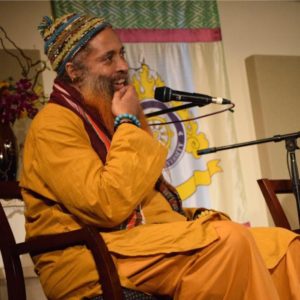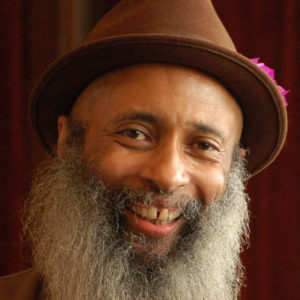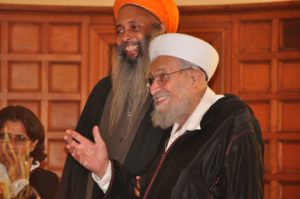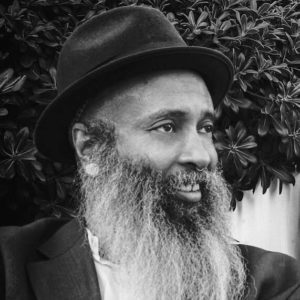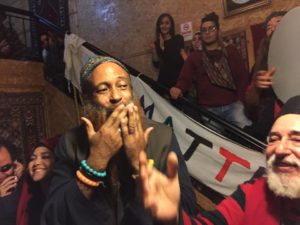Celebrating Dr. Ibrahim Farajaje: A Pioneer of Islamic Studies
“Come, come, whoever you are.
Wanderer, worshipper, lover of leaving.
It doesn’t matter.
Ours is not a caravan of despair.
Come, even if you have broken your vow a hundred times,
Come, yet again, come.”
Mevlana Jelaluddin Rumi
One year ago, we lost our beloved Provost and Professor of Islamic and Cultural Studies, Prof. Dr. Ibrahim Abdurrahman Farajaje. He served Starr King for 21 years until his death in February 2016. A person of irrepressible spirit, Dr. Farajaje was a cherished teacher, colleague, friend, and intersectional “scholartivist.” He inspired countless students inside and outside of the classroom. He partnered with scholars, religious leaders, and organizations to create more opportunities for learning within the school. He mentored people who have since become distinguished religious leaders, activists, artists, scholars and educators.
Dr. Farajaje helped shape Starr King into the counter-oppressive, multireligious seminary it is today. He was the primary architect of the educational model we now employ—a transformative, global, relational, multi-theological and adaptive approach to educating Unitarian Universalist and progressive religious leaders. He championed both immersive education, creating spaces for larger cultural exchanges and deeper learning, and online education, making more and more of our classes and programs accessible to people across the globe and to people of all levels of physical ability. In many ways, he was the soul of Starr King.
His contributions to Starr King are legion, but today we wish to honor specifically one part of this great spiritual leader and teacher’s legacy – his pioneering efforts to advance Islamic Studies.
Pioneering Islamic Studies at Starr King
Since its beginning in 1904, Starr King School for Ministry has taught classes on the study of Islam. But over the past two decades, our school has excelled in pioneering new Islamic scholarship and creating more opportunities for students of all faiths to learn about Islam, thanks principally to Dr. Farajaje.
Before coming to Starr King, Dr. Farajaje taught classes in Islam at Howard University. And he continued to teach in this field in his early years at Starr King. But after the events of September 11, 2001, and the widespread Islamophobia that ensued, Dr. Farajaje and the leadership of the Graduate Theological Union (GTU) recognized that it was more important than ever for aspiring religious leaders in the GTU consortium to increase their understanding of Islam.
In January 2002, the then-president of the GTU, James A. Donahue, called together the Islamic Studies Task Force of the Graduate Theological Union and asked Dr. Farajaje to be its chair. Over the next five years he was the prime architect, working with several other GTU leaders to develop Islamic Studies at the GTU in a cohesive fashion: during that time, curricular offerings in Islamic studies increased by 400%; a range of Islamic scholars and religious leaders were recruited to teach at Starr King and a Center for Islamic Studies was established at the GTU.
A few of the key events that were spearheaded by Dr. Farajaje include:
- The Religious Pluralism in the 21st Century: Muslim Identities in the Diaspora Conference, March 14 -15, 2003. This conference featured panels, cultural events and keynote speeches from Dr. Hamid Algar, Dr. John Esposito, and Dr. Amina Wadud, among others.
- Sufi retreats with guest leaders, including Shaykha Fariha Nur Fatima al-Jerrahi of the Jerrahi Sufi Order and Shaykha Eysin Celabi Bayru, a 22nd generation lineal granddaughter of Rumi.
- A chapel service co-hosted by Starr King and the Center for Jewish Studies called “Gifts of Al-Andalus” which brought Christian, Jewish, Muslim and UU voices together.
Through the Islamic Studies Task Force the variety of courses on Islam at GTU schools expanded considerably. New courses included, among others, Race, Religion, and Islamophobia, Rumi and the Mystical Path of Sufism, and Islams: Multiplicity in Unity.
Read more about the work of the Task Force in GTU’s Islamic Studies Brochure.
Along with its seminal contribution to the establishing of GTU’s Center for Islamic Studies through Dr. Farajaje’s vision and leadership, Starr King made its own commitment to foster the study of Islam. In 2005, largely through the efforts of Dr. Farajaje, the Luce Foundation awarded $350,000 to Starr King in support of the school’s work in Islamic Studies.
Dr. Farajaje’s approach to Islamic and multi-religious studies was based on what he called the Andalusian model. At the school’s 2010 Faculty Summit, Dr. Farajaje shared his vision for this model: “We realized we cannot study [the Abrahamic faiths] separately. We had this dream that students would study sacred texts together. That Jewish, Christian, Muslim and Unitarian Universalist students would study together, would learn all of those texts together, learn prayers together.”
Perhaps the most memorable example of the opportunity to experience this Andalusian model of learning, was the Rumi Immersion program in Istanbul, Turkey, that Dr. Farajaje created and taught for Starr King. The immersion brought students, faculty and friends of the school to Istanbul to learn about Islam, Judaism and Christianity as they have been lived in this important crossroads of civilization. The immersion, a pilgrimage of sorts, culminated in the heart of Turkey, in Konya, during the annual memorial celebration of Mevlana Jelaluddin Rumi, a time when thousands gather for concerts, lectures, sema (ceremony of the whirling dervishes), dhikrs (Sufi ceremony of Divine Remembrance), and other celebrations. This immersion gave students an opportunity to not only study Islam, particularly Sufism, but also to experience the practices of Sufism firsthand. After each immersion, we heard from our students again and again how transformative the Rumi Immersion was for them.
After his work on the Islamic Studies Task Force came to an end, Dr. Farajaje continued to expand opportunities for Starr King students and others to learn about Islam. During his 21 years at Starr King, Dr. Farajaje taught dozens of courses on Islam, particularly recognizing Islam’s intersections with other issues of identity, class, and social and geographic location. Teaching alongside Islamic scholars he helped to recruit, he also helped to facilitate conversations at Starr King with scholars from around the globe about queer/trans perspectives on the study of Islam.
Pioneering Islamic Studies in the World
Dr. Farajaje’s legacy as a pioneer of Islamic studies extends beyond his pivotal work at Starr King to his work in other communities. He was part of religious communities in Berkeley, Turkey, and India. As an academic, he lectured and spoke all over the country and throughout the world about the nature of Islam and its intersections with other faiths and identities. Some notable addresses and writings include:
- 2014 Museum of the African Diaspora, San Francisco, CA: “Islam, Sexuality, HIV: African American Queer Muslims.”
- 2010 “Beyond the Borders of Duality,” in IVRI: The Essence of Hebrew Spirituality: 21st Century Perspectives on an Ancient Tradition (a reflection on the Prophet Ibrahim)
- 2005 Lecture at the Islamic Cultural Center of Northern California, “Towards and Islamic Theology of Liberation for the 21st Century.”
- 2004 Keynote address at the 15th Annual Harlem Week of Prayer for the Healing of AIDS in NYC called “Hajar (as) a model for building sustainable communities for combating HIV/AIDs in Latino & African American Muslim, Christian, and Traditional Religions Communities.”
- 2002 Address at the Pennsylvania African American HIV Summit titled “HIV and Muslim Communities: The Leadership of African American Shia and Sunni Women.”
- Contribution titled “The African Roots of Islam and Sufism in the Americas” for Sufi Books.
Dr. Farajaje took on larger projects to promote the study of Islam as well. He co-created with David Dezern the documentary “Oceans of Mercy: African American Sufi Muslims in the San Francisco Bay Area,” which featured stories from six African-American Muslims. The documentary was named “Best Documentary” at the 2004 New Way Film Festival, sponsored by the Center for the Arts, Religion, and Education at the GTU. He was instrumental in the development of a Ph.D. program in Inter-religious Studies for Muslim leaders, which he was invited to do by the Ministry for Habous and Islamic Affairs in 2005.
Dr. Farajaje developed robust academic scholarship in the field sharing his work not only through traditional academic sources, but directly via social media platforms, such as Tumblr and Facebook. His son Issa remarked, “He was not interested in academia for its own sake. He always asked, ‘What is this meant for? This is meant to educate people, to serve people, to open people up to new things and new knowledge.’” As a public intellectual, he sought to share his work not solely with his peers, but first and foremost with the people it could benefit most.
A Larger Legacy
These are just a few of the many things that Dr. Farajaje did to pioneer the study of Islam at Starr King and the GTU. His most important legacy, however, rests not in particular events or academic contributions, but in his witness and call to an inclusive study and practice of Islam. His colleague and noted Islamic scholar, Dr. Amina Wadud, said, “His most important and longest standing contribution is his call for inclusivity, especially non-conforming and non-binary gendered bodies.”
“With his work he was especially keen to bring in those voices that were not recognized,” his son Kuji, also a graduate of Starr King, explained. “Everyone mattered. Every body mattered. And he lived his life doing that kind of work, where he engaged with all kinds of people from all walks of life.”
“I think his testimony is himself,” said his wife, Katherin. “He wanted to put a message out, but it was really as a living person. It was his witness to the world. And I think it was a very effective witness if you consider how many people were affected by it.”
Starr King School for the Ministry has been critically shaped and molded by Dr. Ibrahim Farajaje’s witness and work. As we build upon his labors to provide more opportunities for the discussion, witness and study of Islam here at the school, we will always remember the profound legacy Dr. Farajaje left us all and will continue to lift up his call for a complex, inclusive, intersectional study of Islam.
